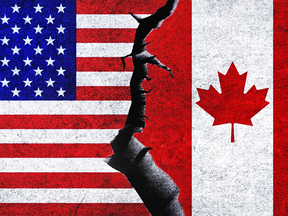Economists warn that Trump’s proposed 25% tariff could trigger a Canadian economic recession in 2024
Economists Warn of Significant Hit to Canadian Economy if Trump Imposes 25% Tariff
The possibility of a 25% tariff on all Canadian and Mexican imports, as threatened by incoming U.S. President Donald Trump, has economists warning of significant economic implications for Canada.
A Potential Recession in 2025?
According to Jimmy Jean, chief economist with Desjardins Group, if the tariff is imposed, "I think we’ll see investment plans being put on hold or stopped altogether, and that would have a decent hit on our investment." Jean argues that even if this latest tariff threat is a negotiation tactic by Trump, the discussion of potential tariffs will still have a significant impact on investment sentiment for Canada.
The Detrimental Effect on Economic Competitiveness
Canadian business groups are also warning about the detrimental effect tariffs would have on economic competitiveness on both sides of the border. President-elect Trump has made it clear that he wants U.S. manufacturing to grow and thrive, but these tariffs would have the opposite effect, according to Dennis Darby, president and chief executive at Canadian Manufacturers and Exporters.
Small Businesses Will Suffer
Dan Kelly, president of the Canadian Federation of Independent Business, warns that the uncertainty will hurt economic recovery for small businesses. Small and medium-sized businesses account for approximately 40% of exports to the U.S., and Canada cannot afford to dismiss this as an idle threat or initial positioning — we need to take this seriously and present, once again, a united front in responding to this challenge.
A Hit on Growth and Inflation
Not only will the tariffs put a drag on growth but could also pose a risk to the inflation outlooks for Canada, Mexico, and the U.S. According to Derek Holt, economist with the Bank of Nova Scotia, "if executed, North American inflation will rise as tariffs are passed onto shoppers and businesses and government procurement programs." This would mean less monetary easing by the Federal Reserve, Bank of Canada, and Bank of Mexico on inflation fears.
Canada’s Energy and Agriculture Sectors Will Recover
Antunes argues that Canada’s energy and agriculture sector would be able to recover after taking an initial hit, by finding other export markets for its products. However, the proposed tariff would doom Canada’s auto manufacturing industry, according to Antunes. "A 25% tariff, I think, would shut down the auto industry in this country if it were to apply and be permanent."
Investment Plans Will Be Put on Hold
Jean argues that even if this latest tariff threat is a negotiation tactic by Trump, the discussion of potential tariffs will still have a significant impact on investment sentiment for Canada. "I think we’ll see investment plans being put on hold or stopped altogether, and that would have a decent hit on our investment."
Business Groups React
Canadian business groups reacted on Tuesday, pointing to the detrimental effect tariffs would have on economic competitiveness on both sides of the border. President-elect Trump has made it clear that he wants U.S. manufacturing to grow and thrive, but these tariffs would have the opposite effect.
Conclusion
The possibility of a 25% tariff on all Canadian and Mexican imports, as threatened by incoming U.S. President Donald Trump, has economists warning of significant economic implications for Canada. While some sectors may be able to recover, others will suffer significantly. Business groups are also warning about the detrimental effect tariffs would have on economic competitiveness on both sides of the border.
Sources:
- Desjardins Group
- Canadian Manufacturers and Exporters
- Canadian Federation of Independent Business
- Bank of Nova Scotia




